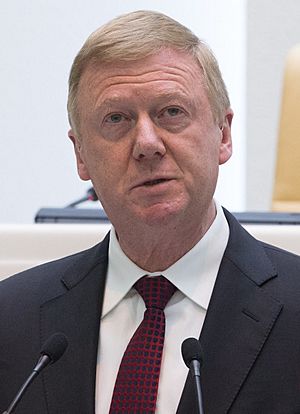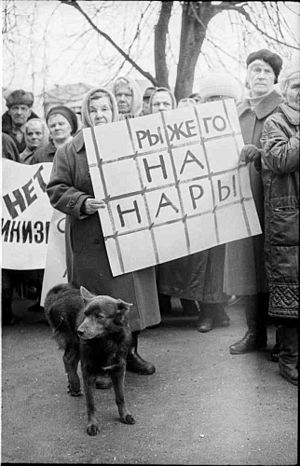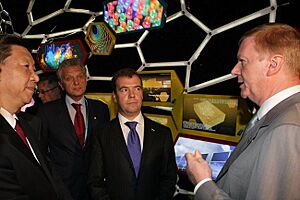Anatoly Chubais facts for kids
Quick facts for kids
Anatoly Chubais
|
|
|---|---|
| Анатолий Чубайс | |

Chubais in 2017
|
|
| Special Representative of the President of the Russian Federation for Relations with International Organisations to Achieve Sustainable Development Goals | |
| In office 4 December 2020 – 22 March 2022 |
|
| Chairman of the Executive Board of Rusnano | |
| In office 22 September 2008 – 3 December 2020 |
|
| First Deputy Prime Minister of Russia | |
| In office 7 March 1997 – 23 March 1998 Serving with Boris Nemtsov
|
|
| Prime Minister | Viktor Chernomyrdin |
| In office 5 November 1994 – 16 January 1996 |
|
| Prime Minister | Viktor Chernomyrdin |
| Deputy Prime Minister of Russia | |
| In office 1 June 1992 – 5 November 1994 |
|
| Prime Minister | Yegor Gaidar (acting) Viktor Chernomyrdin |
| Kremlin Chief of Staff | |
| In office 15 July 1996 – 7 March 1997 |
|
| President | Boris Yeltsin |
| Preceded by | Nikolai Yegorov |
| Succeeded by | Valentin Yumashev |
| Minister of Finance | |
| In office 17 March 1997 – 20 November 1997 |
|
| Prime Minister | Viktor Chernomyrdin |
| Preceded by | Aleksandr Livshits |
| Succeeded by | Mikhail Zadornov |
| Member of the State Duma | |
| In office 11 January 1994 – 15 January 1996 |
|
| Personal details | |
| Born |
Anatoly Borisovich Chubais
16 June 1955 Borisov, Minsk Oblast, Byelorussian SSR, Soviet Union (now Belarus) |
| Nationality | Russian, Israeli |
| Political party | Independent |
| Other political affiliations |
Communist Party of the Soviet Union Union of Right Forces |
| Spouses |
Lyudmila Grigoryeva
(m. 1978; div. 1989)Maria Vishnevskaya
(m. 1990; div. 2011)Dunya Smirnova
(m. 2012) |
| Relations | Igor Chubais (brother) |
| Children | 2 |
| Signature |  |
Anatoly Borisovich Chubais (Russian: Анатолий Борисович Чубайс; born 16 June 1955) is a Russian-Israeli politician and economist. He played a big role in Russia's move to a market economy in the early 1990s. This happened after the Soviet Union ended. He was a key person in charge of selling state-owned businesses to private owners, a process called privatization.
From 1998 to 2008, he led a large state-owned electricity company called RAO UES. Later, from 2008 to 2020, he was the head of the Russian Nanotechnology Corporation (RUSNANO). In December 2020, he became a special representative for the Russian president. He worked on relations with international groups to help achieve Sustainable Development Goals.
In March 2022, he left his job and Russia. Media reports said he did this because he was against the Russian invasion of Ukraine. He is the highest-ranking Russian official to have resigned over the invasion. He later moved to Israel and became an Israeli citizen. In 2024, he started the Center for Russian Studies at Tel Aviv University.
Contents
Early Life and Education
Anatoly Chubais was born on 16 June 1955 in Borisov, which was then part of the Soviet Union. His mother had an economics degree but stayed home to care for her children. His father was in the military. Anatoly has an older brother, Igor Chubais, who is a philosopher.
In 1977, Anatoly Chubais finished his studies at the Leningrad Institute of Engineering and Economics. This university is now in St. Petersburg. He was a member of the Communist Party of the Soviet Union until 1991.
Career Beginnings
Early Work and Ideas (1977–1991)
While working at his university, Chubais started a group called Reforma. This group helped Leningrad become a place for political change. They worked on ideas for local and national elections. They also helped write new laws. In 1983, he earned his Ph.D. in Economics.
In the early 1980s, Chubais became a leader for economists in Leningrad who believed in a market economy. He and others wrote articles about how businesses needed more freedom. He also met Yegor Gaidar, who later became the Prime Minister of Russia.
By 1987, Chubais helped organize the Leningrad chapter of the Perestroyka club. This club aimed to share and discuss democratic ideas. Many people who later became important in Russian politics were part of this group. The group even raised money by selling flowers to support democratic candidates in elections.
At first, Chubais was against the idea of using "vouchers" for mass privatization. He worried it would cause too much inequality. However, he later became a strong supporter of this very idea.
Leading Privatization in Leningrad (1990–1994)
In 1990, Anatoly Sobchak became the head of the Leningrad City Council. Chubais became his deputy. He worked on creating a special economic zone in Leningrad. In 1991, he became an advisor to the mayor's office in St. Petersburg (Leningrad was renamed). He also led a new research center for economics.
Working for President Yeltsin (1992–1999)
In November 1991, Chubais joined President Boris Yeltsin's government. He was in charge of the committee that handled privatization in Russia. This meant selling government-owned businesses and properties to private individuals and companies.
Chubais wanted quick privatization to bring in money. However, the Russian parliament did not agree. They decided on a "voucher privatization" program instead. This program gave vouchers (like coupons) to citizens, which they could use to buy shares in former state companies. This program was very large. While some people became very rich, many ordinary citizens lost their savings in a short time.
From 1994 to 1996, Chubais was a deputy prime minister. During this time, Russia's economy became more stable. Inflation, which is when prices go up quickly, dropped a lot. He also represented Russia in important international financial groups.
After leaving his deputy prime minister role, Chubais helped manage Boris Yeltsin's campaign for re-election in 1996. Yeltsin's popularity was very low, but Chubais helped him win the election. From 1996 to 1997, Chubais was the chief of the Presidential Administration of Russia. This was a very powerful position.
Chubais also took part in international meetings like the Bilderberg Club. He was also elected to the Board of the Russian Union of Industrialists and Entrepreneurs.
Leading Energy and Technology Companies
RAO Unified Energy System of Russia (1998–2008)
In 1998, Chubais became the head of RAO UES of Russia. This was the state-owned company that controlled all electricity in Russia. He believed that this company needed to be reformed. He wanted to break it up into smaller parts and sell most of it to private investors. He thought this was the only way to get enough money to update Russia's electricity system.
His reforms helped bring in over $30 billion from private investors. This money was used to build new power plants and improve electricity lines. His work also helped stop the use of barter (trading goods instead of money) for payments in the energy sector. In 2007, a Russian newspaper called him the "Professional of the Year" for his work in reforming the energy monopoly. In July 2008, RAO UES stopped existing as a single company.
RUSNANO (2008–2020)
From September 2008, Chubais became the General Manager of Rosnanotech, later known as RUSNANO. This government company's job was to encourage new ideas and technology in Russia. It focused on areas like nanotechnology. RUSNANO aimed to find new ways for Russia's economy to grow, beyond just selling oil and gas.
Under his leadership, RUSNANO completed many projects. They opened new factories and research centers. The company helped develop new technologies and businesses in Russia. Chubais left RUSNANO in December 2020.
Recent Activities
Resignation and Move to Israel (2022)
In December 2020, Anatoly Chubais was appointed a special representative for the Russian president. He worked on connecting Russia with international groups to achieve global development goals.
However, on 22 March 2022, he resigned from this position. He left Russia because he was against the Russian invasion of Ukraine. He traveled to Istanbul, Turkey, and later moved to Israel. He is the highest-ranking Russian official to have resigned due to the invasion.
Independent Research and New Center (2023–2024)
In 2023, Chubais published an article in a Russian academic journal. He wrote about economic problems in Russia in the early 1990s. He described himself as an independent researcher from the UK.
On 16 April 2024, Anatoly Chubais launched a new organization called the Center for Russian Studies (CRS) at Tel Aviv University. The center's goal is to study Russia's possible future by looking closely at its recent past. Chubais said that understanding Russia's history is important for learning lessons for the future.
Personal Life
Anatoly Chubais is married to Dunya Smirnova, who is a screenwriter and TV presenter. He has two children from his first marriage: a son named Aleksey and a daughter named Olga.
In August 2022, Chubais shared that he was in the hospital with a neurological condition called Guillain–Barré syndrome.
Political Involvement
Anatoly Chubais has been involved in several political groups and parties in Russia. In 1993, he helped create the "Russia's Choice" political group. He was elected as a deputy to the Russian parliament, called the State Duma, under this group.
He also helped found and lead the "Democratic Choice of Russia" party. In 1998, he became part of the "Right Cause" coalition. In 2000, he was a co-chairman of the "Union of Right Forces" party, which focused on right-wing politics. He later resigned from his leadership role in this party but remained involved.
In 1996, Chubais started the "Center for Protection of Private Property" Foundation. In 2010, he became the chairman of the board of trustees for the Gaidar Foundation, which focuses on economic policy.
Awards and Recognition
Anatoly Chubais has received several awards for his work.
- In 1997, the British magazine Euromoney named him the world's best Minister of Finance.
- In 2001, he received an honorary diploma from the International Union of Economists. This was for his important contributions to Russia, especially for bringing in modern ways of managing the economy.
- In 2008, he received a Presidential Commendation for helping write parts of the Russian Constitution and for his work in promoting democracy in Russia.
- In 2010, he was given the IV degree Order of Merit for the Fatherland. This was for his great work in nanotechnology.
- He also received three other presidential commendations in 1995, 1997, and 1998. He has an honorary Ph.D. from the St. Petersburg State Engineering and Economic University.
Images for kids
See also
 In Spanish: Anatoli Chubáis para niños
In Spanish: Anatoli Chubáis para niños
 | Toni Morrison |
 | Barack Obama |
 | Martin Luther King Jr. |
 | Ralph Bunche |




